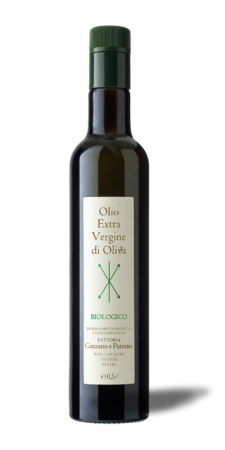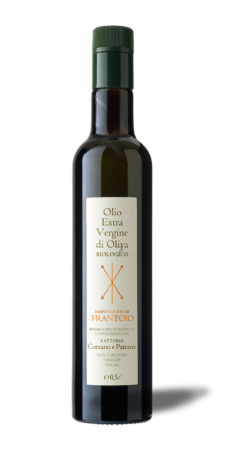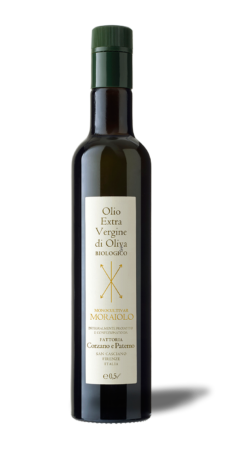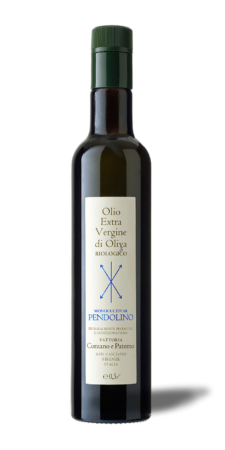Our olive groves are cultivated following the principles of organic agriculture and the only fertiliser used is the manure from 700 our sheep. The harvest takes place by hand in November, separately according to variety. All our olives are pressed in the experimental oil mill Torre Bianca of Marco and Matteo Mugelli. The varieties are worked separately, with the machine’s parameters being adapted each time depending on the olive’s maturity and type.
Crushing is done with metal knives. The paste is malaxed (mixed) in vertical mixers under vacuum, to reduce its oxidation as much as possible. Oil is then extracted by a decanter that enables us to avoid adding water at any point during the process. The paste enters the decanter at 23° C. Obtained oil is then not passed through the usual separator but is immediately filtered. Before being bottled the oil is held in stainless steel protected by inert gas (Argon). In 2018 the yield was 10-13%. The oil is bottled in 250 cl and 500 cl in three types: blend, single varietal Frantoio and single varietal Moraiolo. The blend is also available in 3 and 5 litre tins.
All these are factors must be taken into consideration during the extraction process:
- The time between picking and extracting must be as short as possible to avoid oxidation and fermentation
- During the mixing oxidisation must be kept to a minimum to avoid enzymatic fermentation that harms aromas and polyphenols
- Extraction in the decanter of the oil from the paste happens without water being added: aromas and the polyphenols most important for quality (biophenols and tocopherols) are hydro soluble and would be washed away and lost during the centrifugation process
- The efficiency of the decanter and the lack of water added allow to skip the final cleaning with the centrifugal separator which, in order to work, would entail a further addition of water, resulting in a lesser oil
- The immediate filtration if the oil is fundamental to ensure that its health and taste characteristics last in time
- Polyphenols, especially biophenols and tocopherols, are very strong antioxidants and considerably influence the durability of the oil’s quality as well as having health benefits. Poor quality industrial olive oil often has a polyphenol content of less that 100mg/l; olive oil produced in most of today’s mills rarely passes 300mg/l. However, oil produced carefully following a procedure as described here contains from a minimum of 600mg/l to over 1000mg/l.



